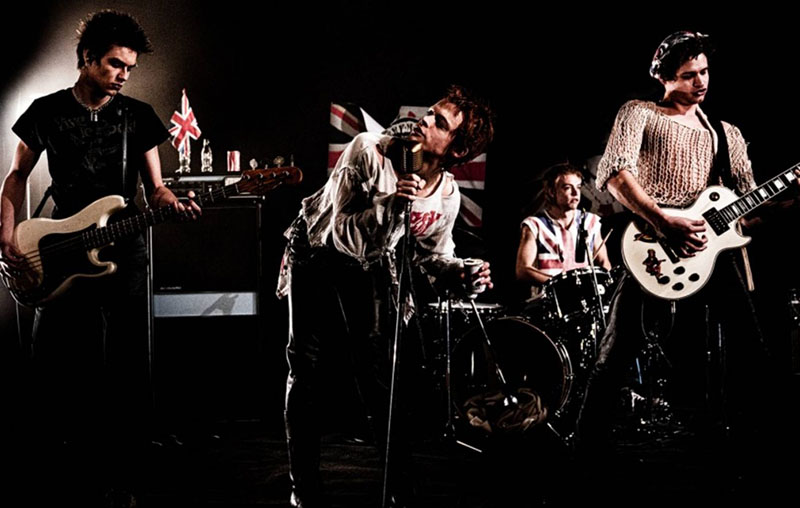Let’s not forget this is a path that has already been trod in three theatrically released motion pictures; “The Great Rock and Roll Swindle”, “Sid and Nancy” and “The Filth and the Fury”. In all fairness, only the latter counts as an historical document, but even that suffers from romanticism colouring the retelling.
Yes. The time line has been changed for dramatic purpose. Stories do that in a desperate attempt to bring meaning to the random chaos that is life and these are lives of desperate random chaos and near infinite damage. Some of the program’s structure would absolutely collapse if played in linear time. There’s at least one scene at the end invented to create a narrative bow. So what?
I could also point out the dialogue does suffer from dumping exposition. This is particularly true of the character of Steve Jones’ dialogue in the first episode. Often it sounds like he’s just reading passages from his book “Lonely Boy” (on which the program is loosely based) in an attempt to either kick start the plot or to make an attempt at nostalgic auto-hagiography.
However, I do remember how everyone spoke late at night in the 1970s when speed mixed with beer. Let’s face it. Everyone spoke like they were doing an exposition dump in a movie so… fair enough.
Yes. The actors are all prettier than the characters they portrayed and no amount of cosmetic zits can disguise that. Nineteen-seventies NHS dentistry was practical rather than cosmetic.
Additionally, the band who can’t play/singers who can’t sing legend is perhaps pushed a little too heavily as well. I’m trying to decide if Gary Oldman’s version of Sid’s distinctive warble was more extremely off key in Alex Cox’s “Sid and Nancy” but it might be too close to call.
Both Rotten and Vicious had timing and weren’t nearly as shouty as the actors of "Pistol". Saying Paul Cook wasn’t a magnificent drummer defeats all reason. We can also be fairly certain Steve Jones didn’t learn to play guitar the way he did in the show by taking black bombers for five days straight. Frankly, you don’t pick up a self-tuning guitar and magically reinvent the concept of chords.
Even the real Sid Vicious managed a strained but passable 33rpm version of Dee Dee Ramone on all the available live recordings of times smack was kept to a minimum. He was no Glen Matlock but he could have got a job playing bass in any contemporary punk band in London.
But this show is mostly about the myth of the story.
Mostly.
Where "Pistol" works best is the compassion it has for its characters. Whilst John Lydon has been amongst the show’s biggest critics, his portrayal is particularly flattering. He cares, not just about the band, its direction and its music but about people (with the noticeable exception of Matlock and McLaren but that is historically accurate).
The story loves its monsters but plays a little attention to the prey caught in the headlights. The boys who don’t have enough dis-function in their lives get little screen time. In six hours, Paul Cook gets to explain the importance of playing slower, Wally gets kicked to the curb and Glen is the straight man to everyone’s abuse. At least he does get to say that he too understands oppression in a brief scene that managed to escape the cutting room floor.
Maybe they’ll get their side of the story in the next film. They will need to invent some fairly horrible things to find their way into the higher pantheon.
Even Nancy Spungen gets a scene to explain her damage and to gain a shred of sympathy beyond her monstrous reputation. Her co-dependence with Sid is not fully explored but, fair enough, that movie has already been done.
McLaren’s ultimate reveal as the villain of the piece is explained as him being just another lost man child pretending to be a grown up, no different to his charges.
"Pistol" also gets the geography right. Even when it is not filmed in the right street, it looks like the right street. The shop Sex/Seditionaries looks right even though it looks to have maybe a little too much Tardis to it. At least a number 11 bus still stops outside. There’s a lot of nostalgic charge to the visuals. Even when it’s a set, you feel like it’s somewhere you’ve been or it’s like somewhere you’ve been.
I particularly liked the portrayal of the female characters. Chrissie Hynde, Jordan and Helen of Troy all appear with their hands on the tiller, guiding the action and the narrative and providing the kind of moral backbone they would emphatically deny. The long suffering Sophie probably deserved a little more screen time. Vivienne Westwood also guides the tiller but is portrayed as much more flawed. Like her fellow monsters she strives for good but often fails.
You walk away from the show with a quiet understanding of why the Sex Pistols were so much more than their lost boy peers. There were thousands of shouty lads in the 1970s but most of them drew counsel from other shouty lads.
I once again recommend it. You will have your gripes and your groans but anyone who was around and invested in the rise of punk will at least find some connection.
Despite being from the house of mouse, it is certainly better than the crap on real television.



